
Classic wooden "bay-built" hulls meet a variety of needs, from hauling crab pots and oystering to charter fishing. They feature sharp bows, big cockpits, forward helms, and semi-displacement, shallow V-hulls and straight-shaft inboards. They've never been built for efficient speeds above 20 mph, much less a soft ride at such velocities.
How did Murrell assemble a team to pull it off?
THE DESIGN
Martin Hardy and his sons, Lewis and Rob, of Composite Yacht (compositeyacht.biz) went to work. "Let's hire an architect, build it on paper, then test it." They signed naval architect Lou Codega, who's drawn Regulator Boats, Cabo Yachts and others.
Tank testing took place at the venerable Stevens Institute of Technology.
"The owner wanted a deadrise-style boat that's really fast. The tricky part of this design is the forward position of the helm," Codega says. As most boaters know, the ride gets rougher the closer that someone one sits or stands toward the bow.
"To run soft in bay chop, I had to make the forefoot as sharp as possible without inducing bow steer," Codega explains. "Being big is a trait that buys you ride quality, especially in the Chesapeake." The boat measures 55 feet, with only 16 feet of beam.
A narrower beam helps in achieving a softer ride and higher speed goals.
Bu hikaye Boating dergisinin November 2022 sayısından alınmıştır.
Start your 7-day Magzter GOLD free trial to access thousands of curated premium stories, and 9,000+ magazines and newspapers.
Already a subscriber ? Giriş Yap
Bu hikaye Boating dergisinin November 2022 sayısından alınmıştır.
Start your 7-day Magzter GOLD free trial to access thousands of curated premium stories, and 9,000+ magazines and newspapers.
Already a subscriber? Giriş Yap
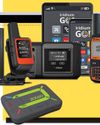
AFFORDABLE SATCOM
Communications devices using satellite technology are more abundant today than any time in the past. What's more, many are portable, ultra-compact, affordable relatively and designed for boating, dispelling any perceptions that you need a big, expensive dome antenna aloft to access satellite communications.

IN THE BEGINNING
REPOWERING FOUNTAIN HULL NO.1
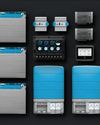
NAVICO GROUP FATHOM 2.0
Engine charging at 48 volts could be a game-changer.
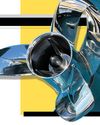
PROPS FOR INNOVATION
Sharrow MX3 propellers live up to most of the company's performance-improvement claims.
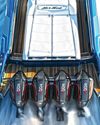
MERCURY RACING 500R
Supercharged power for a variety of boats.
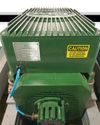
FLIPPING THE SWITCH
Much reporting focuses on reasons why one might choose electric marine power. The issues of range, speed, noise levels, winterizing and ethanol challenges, lake restrictions, environmental concerns and more all must be resolved on an individual basis. Little gets said about how a boater choosing to repower with electric actually gets that accomplished. Is it DIY? And if not, how does it get done?

TOW-VEHICLE TECH
If it's been a while since you bought new tow vehicle, you might be surprised by the many built-in advancements in trailering technology. New tow tech ranges from integrated weight scales and adaptive suspensions to systems that automatically back up your truck to hitch up your trailer. Here are a few examples to look for. -Jim Hendricks

MONUMENTAL TIPS FOR BACKING A TRAILER
Three Boating greats offer advice for a perennial reader query.
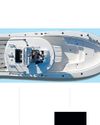
STICKING POINTS - Anchoring alternatives, and why you will always need a traditional anchor.
My brother-in-law likes to fish offshore reefs, and the process once entailed navigating to a mark, dropping a float, and idling upwind or up-current to drop the anchor in hopes the set would drop us back to the float.
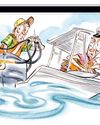
FOR WANT OF A CLAMP
When 100 miles from shore, home and help, this boater’s preparedness prevented potential catastrophe.